What is revenge bedtime procrastination?
If you're tired of feeling exhausted and overwhelmed, it's time to take a step back. Think – whether you unconsciously delay sleep? Stop there because you don't want to jump to the wrong conclusion. So, this behaviour is often a sign of underlying stress/anxiety or lack of free time earlier in the day.
In such circumstances, a person may be unable to pursue their interests or responsibilities. To compensate for that, there is a need (revenge) to use late-night hours, and a sense of control is gained. The reality is that it's definitely out of control, which is the source of all the problems.
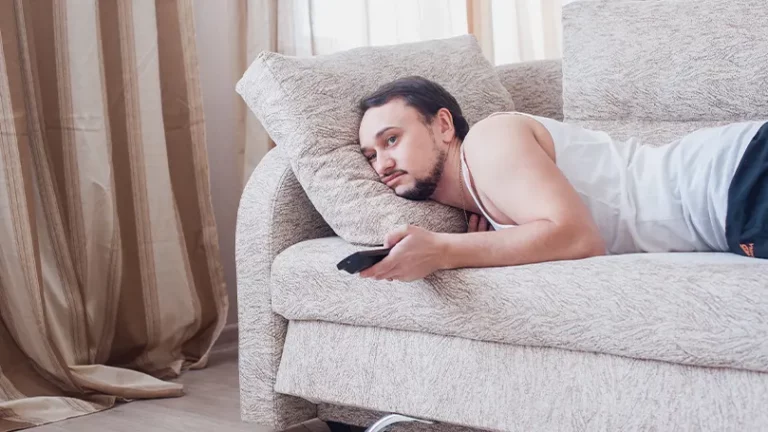
Okay, we don't want to scare you.
However, you should be careful when it comes to this habit. After a short time, it can disrupt your sleep schedule and affect your overall well-being. The good thing about habits is that they are changeable.
That way, you can avoid various health problems: impaired cognitive function, mood swings, and weakened immunity. Don't forget looking at your phone screen for too long and certain medical conditions also make it difficult to fall asleep. How can you tell the difference between revenge bedtime procrastination and other conditions?
We'll go through the most common symptoms to get to the answer.
Symptoms
Anxiety is a normal human emotion. A feeling of nervousness and concern is characteristic. It can be experienced during stressful situations and sometimes lingers longer than usual. Then it can interfere with everyday life, as well as nightlife. However, sometimes it hides in us and manifests itself as a form of revenge bedtime procrastination. In this case, the symptoms are:
- Difficulty falling asleep – racing thoughts or general feeling of restlessness occur
- Oversleeping – when you stay up late, you sleep longer in the morning
- Feeling tired during the day – this affects productivity, mood, and overall quality of life
- Excessive use of electrical devices – this makes it even more difficult to relax and wind down
- Feeling guilty about sleep – a cycle of negative emotions is created
Remember, these are unhealthy behaviours that you must not ignore. To prevent negative consequences, seek support from a mental health professional. In the meantime, find out what's behind these symptoms!
Why does it happen?
Revenge bedtime procrastination or sleep procrastination can happen for several reasons. It is mainly associated with a lack of control over the day and night schedule. How? Well, life can often be stressful. Doing so means a daily schedule that takes time for self-care and leisure activities. That's when we feel like we're on the fast lane!
But this phenomenon can also be a form of self-sabotage. Of course, there is no conscious intention. Simply put, people feel like they have no control over their lives during the day. In the end, they try to make up for it at night. Let's talk about it in a little more detail.
Work and life balance
To understand how work and life balance affects this state, we have to look at the activities during the day. We always need that extra hour in the day – to finish a task, rest or whatever.
Well, sometimes we need a whole day, week or month. When you seem to need an entire year to make up for a lost time, anxious thoughts begin. It's a sign that you must establish a better work-life balance!
In fact, remote work has further exacerbated a long-standing problem. In that case, switching off from work is even more difficult because your office is at home.
Overall, make an effort to prioritize self-care and fulfil obligations on time.
Stress and anxiety
Finally, revenge bedtime procrastination can be related to underlying mental health issues. But let's explain the difference between stress and anxiety. Knowing the differences, you can seek and receive adequate help.
There is a fine line between these two terms, as both represent an emotional response. However, stress is usually caused by an external trigger. On the other hand, anxiety is defined by excessive worries that do not disappear even in the absence of stressors.
Therefore, it affects sleep patterns and insufficient amount of sleep. After that, you wake up tired and so on in a circle. Do you also know that certain foods cause/increase anxiety and insomnia? These are caffeine, alcohol, processed foods or refined carbohydrates.
Technology addiction
Addiction to digital technologies is not taken seriously by many. However, it can manifest as any other addiction. These habits take various forms, the closest of which are: video games or social networks.
It is difficult to pinpoint the exact cause of digital addiction. If we see it as an escape from reality, the cause may be anxiety. However, it may be a habit that has changed all priorities in life. However, the pleasure centre of the brain plays a decisive role.
Unfortunately, such a situation leads to increasing dissatisfaction. This makes it difficult to fall asleep. The symptoms are poorer concentration, changing night for day, daytime sleepiness, and reduced productivity.
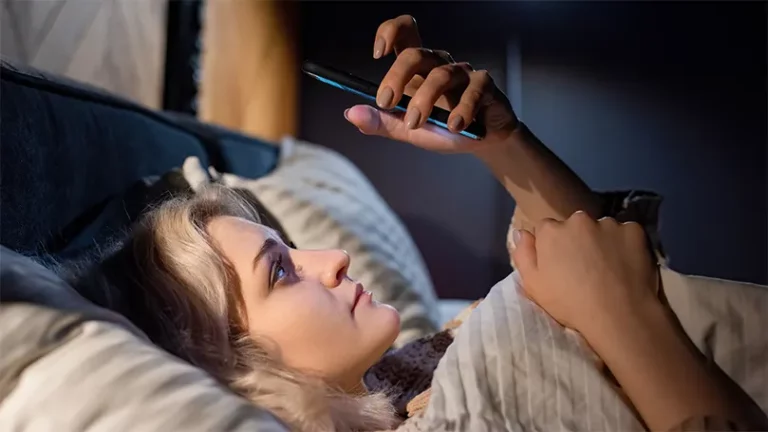
Adverse effects of revenge bedtime procrastination
So far, we have talked a lot about mental health. Do you know how staying up late affects your physical health? For starters, it can ruin your look. This applies to excess weight – regardless of whether you exercise or not. It has a much more significant impact on your overall health.
Sleep deprivation
Ah, where to begin? Due to the lack of sleep, there is absolute chaos in the body! After just one sleepless night, your cognitive functions are weaker. Then, the mood is worse, and you feel tired throughout the day. It makes you clumsier. Imagine what happens after a long period of sleep deprivation.
For example, your immune system declines, and you become susceptible to colds. Since it releases proteins called cytokines during sleep, they are produced less. So, everything leads to sleep disorders and anxiety.
Health problems
Lack of sleep affects the increase in blood pressure, which over time, can cause damage to the heart muscle, arteries, or kidneys. As you become irritable, there is an increased secretion of cortisol (stress hormone). Wrinkles, broken capillaries, dark circles, acne, age spots… Also, the entire ageing process of the body is accelerated.
The level of testosterone as well as sex hormones, falls, which means that the libido weakens. What happens to our immune system? Lack of sleep and poor-quality sleep cause reduced T-cells, white blood cells responsible for fighting disease-causing organisms in the body. Then we are susceptible to various diseases.
Impact on daily life
Our brain spontaneously reorganizes information during sleep. So it has an essential job during night sleep. If we deprive it of that, it will be difficult for us to concentrate and develop new ideas in the morning. You will complete the job successfully, but it will take significantly longer and your daytime life will feel terrible.
Increased negative emotions have an impact on other people around you. Therefore, they can potentially damage interpersonal relationships, both personal and professional.
Don't forget that many brain areas play a role in making the right decisions. Unfortunately, lack of sleep causes a decrease in their function.
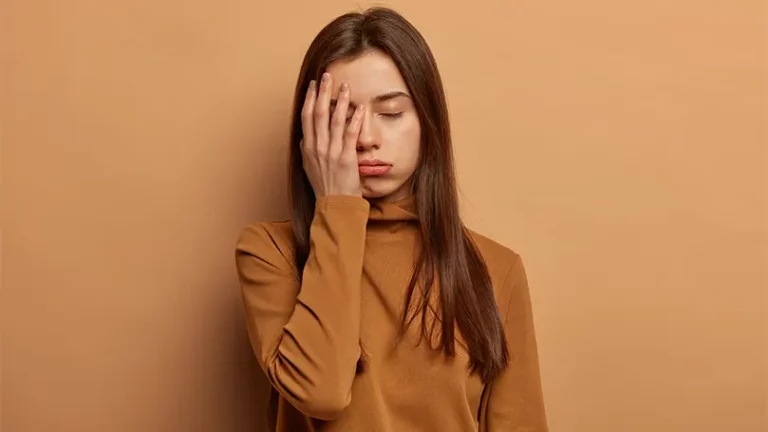
Tips to overcome it
This is just like one of those mysteries – what came first, the chicken or the egg? While we're pretty sure the egg came first, we can't say the same for anxiety.
It occurs most often when the body needs rest, at night. However, lack of sleep can also trigger nervousness, leading to anxiety. Ugh, it's hard to tell.
BUT there is a way. We must consider the other symptoms, the intensity of the anxiety, the duration and the daily duties. Only when you are sure what is behind the symptoms, you can start looking for a solution. Here's what worked for us:
Create a sleep schedule and bedtime routine
Help your circadian rhythm work in sync and produce those proteins. The key to a good night's sleep is being consistent with bedtime and wake-up times. It is also advisable to have good bedtime rituals to help set the tone for enough sleep. Here are some things you can do to sleep early.
Use the last half hour before bed to finish the tasks you started during the day. Send e-mails, pay bills electronically or make a to-do list for the next day. Warm water will help you fall asleep faster, so take a warm bath. Before/after you can include aromatherapy, yoga or meditation. It will help you relax your mind and body.
Avoid blue light
It's time to turn off all devices that emit blue light. This means a laptop, iPad, tablet and mobile phone. Blue light prevents the release of melatonin, the hormone that signals the body that it's time to sleep. Understand that the bed is the place for sleep (and sex.) So, never bring your laptop to bed to do more work, or have a quick bite, etc.
Limit stimulants
What does falling asleep look like? Well, at least 15 before going to sleep, you need to calm down completely. No more talking to your partner, writing a journal, or reading a book. Don't forget to go to the toilet first. But let's go back 45 minutes.
To really fall asleep, you need to make preparations. Incorporate relaxation techniques, such as breathing exercises or light stretching exercises. It's not enough to turn off your phone, but also anything else that stimulates your brain. Otherwise, you're giving it a signal that it's time to wake up instead of going to bed.
Caffeine and alcohol are forbidden at least a few hours before sleep.
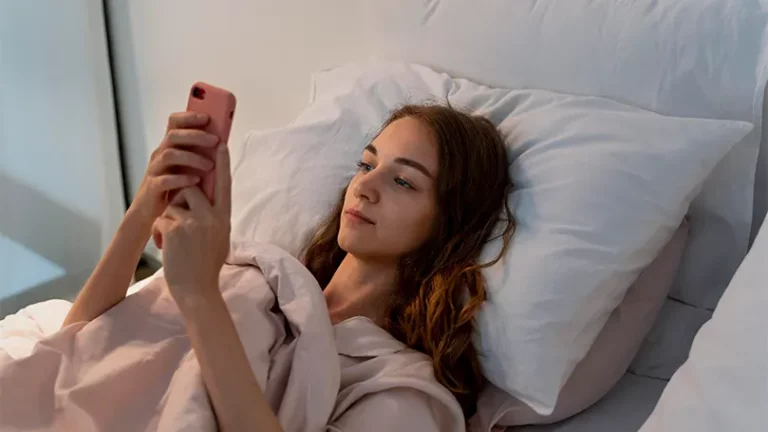
Other techniques to combat revenge bedtime procrastination
- Cognitive Behavioral Therapy – Cognitive-behavioral therapists teach us that our thinking causes us to feel and behave in a certain way. In this way, people with anxious behaviour acquire new skills and eliminate irrational fear and can help you to stop delaying sleep.
- Exercise – Exercise increases the secretion of neurotransmitters that stabilize mood (serotonin, norepinephrine and GABA). For example, do a quick cardio workout in the morning before a busy day or to relax at the end of such a day.
Conclusion
Overall, revenge bedtime procrastination leaves a million adverse effects. In this case, it endangers your psychological and mental health. Many people get trapped in that vicious cycle of anxiety and stress. The main reason is insufficient information about this phenomenon.
So, the next time you find yourself putting off sleep, ask yourself why you're doing it. If you notice some of the above symptoms, just apply our tips!
Remember, your priority should be healthy sleep habits and establishing a good work-life balance. So, be kind to yourself, and enjoy a good night's sleep!

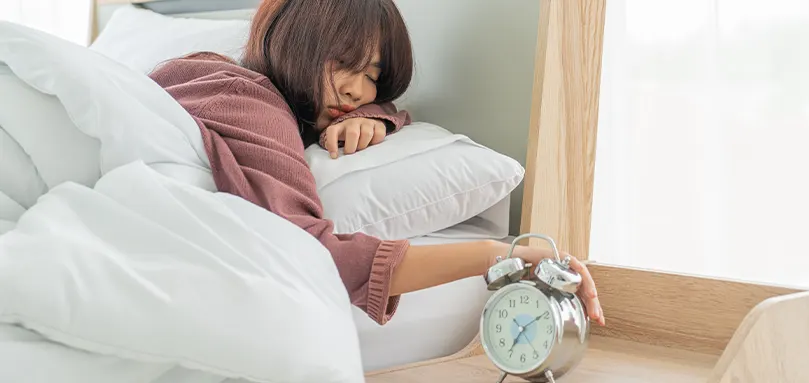
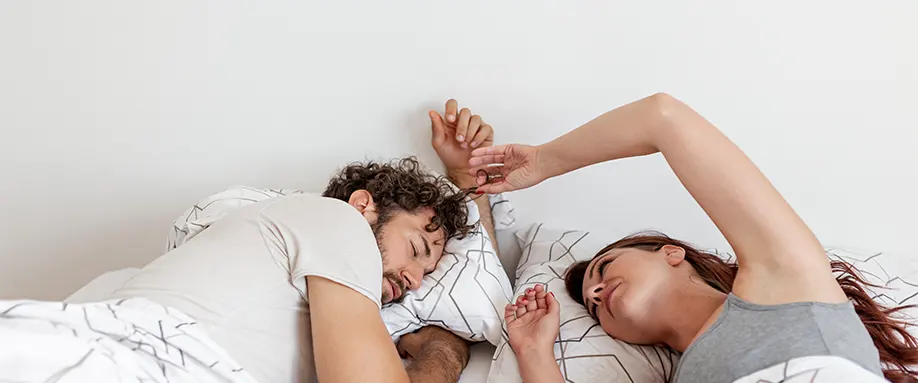












There are no comments yet
"*" indicates required fields